Search Posts
Recent Posts
- Rhode Island Weather for October 26, 2024 – Jack Donnelly October 26, 2024
- Sports in RI: Time for safety first – John Cardullo October 26, 2024
- In the News… recap for week ending 10.26.24 October 26, 2024
- Burn with Kearns: Secret weapon #1 for staying functionally fit – Kevin Kearns October 26, 2024
- To Do in RI: Laboring for Freedom at Slater Mill, Pawtucket October 26, 2024
Categories
Subscribe!
Thanks for subscribing! Please check your email for further instructions.
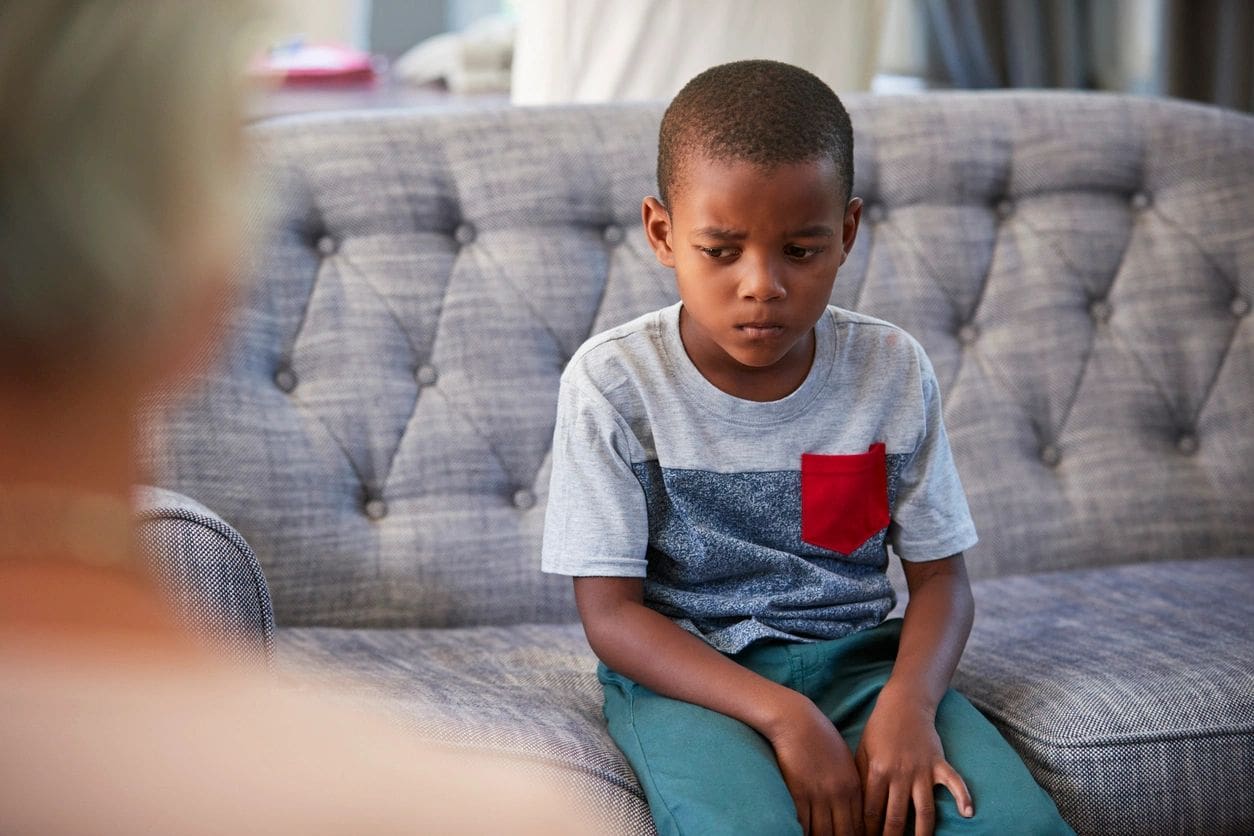
“We cannot ignore the peril of children…” DCYF letter on legal obligation to report neglect in homeless crisis
RINewsToday did a report earlier this week on the concern about children living outdoors or in unheated circumstances, “unfit for human habitation” as part of the homeless crisis impacting Rhode Island as the weather turns bitterly cold.
In response to our article, Kevin Aucoin, Acting Director of the RI Department of Children Youth and Families send a memo out to a broad group expressing concern and noting the legal obligations EVERYONE has to protect children in dangerous circumstances.
Aucoin said, “I am concerned about several media reports of parents and children residing in the encampment areas in very harsh conditions. I am seeking your cooperation in our attempts to connect with these families. DCYF stands ready and willing to support these families. If you have any information regarding these families please forward that information to DCYF as soon as possible.”
Here is the letter:
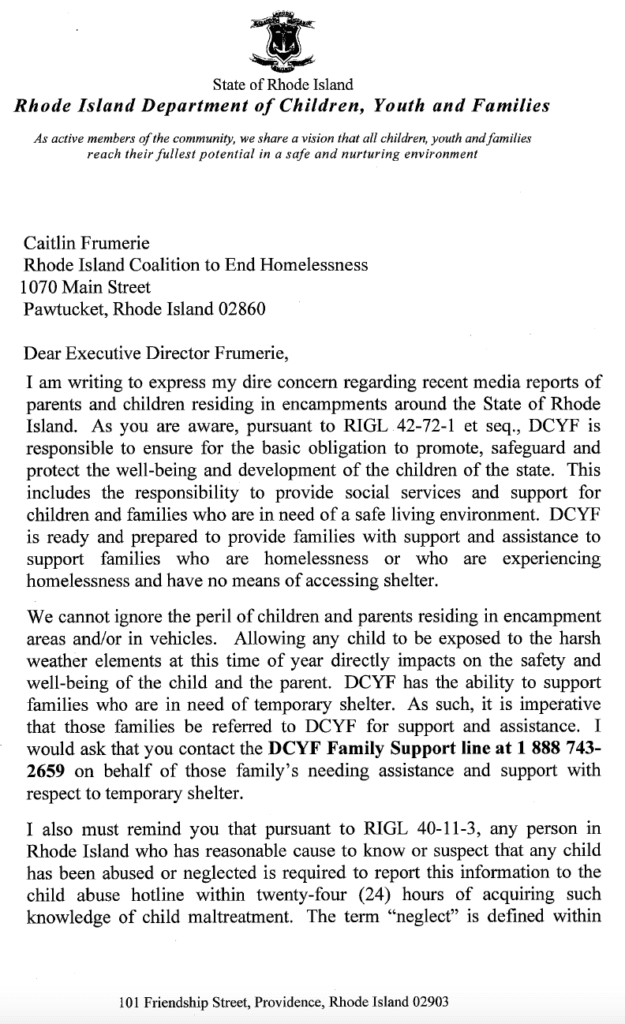
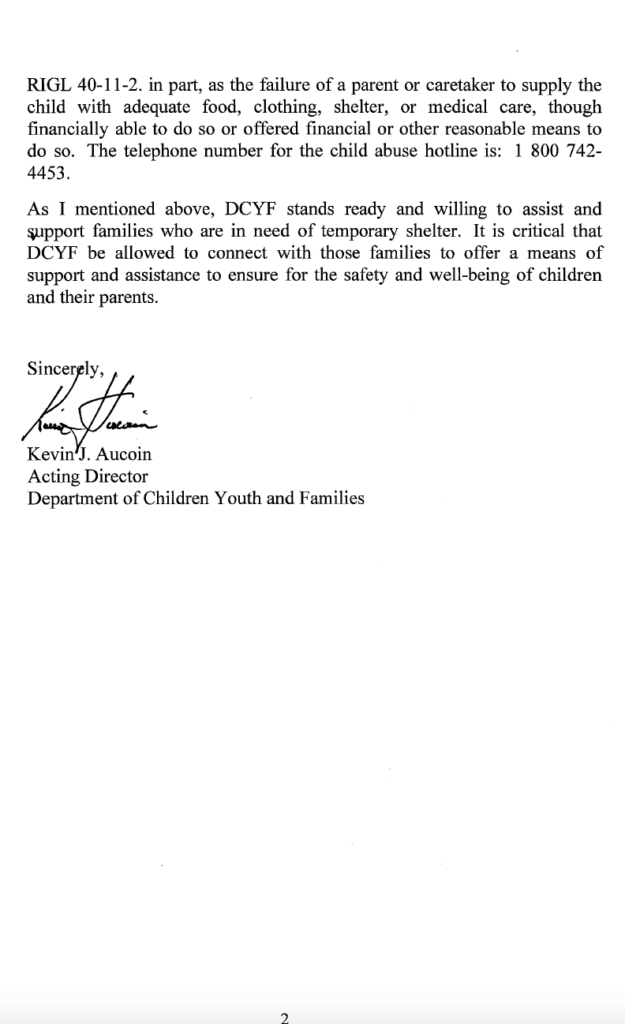
___
Our story of December 13, 2022 – “Homeless in RI: Children go where I send you…”
“Children, go where I send thee” is a traditional African-American spiritual song, known this time of year as a Christmas carol.
The temperature in Providence is 25 degrees. It feels like 11.
Are there homeless children living on the streets? Rhode Island doesn’t really know. Officially. However, the recent homeless crisis on the steps of the Rhode Island State House has raised the question in an urgent way.
The state has asked for a specific location list of the “82 encampments” of homeless people that advocates say exist throughout Rhode Island. Advocates have been hesitant to provide that to the Governor’s office, saying instead that they would drive them to the encampments in an escorted tour, of sorts.
One reason encampments are under the radar is, according to advocates, is parents’ fear that their children would be taken away from them if officials knew how they were living. In news reports from the day at the RI State House when advocates and homeless walked the halls chanting, “Shame – shame – shame!” at people in the building, demanding to see the Governor, at least one family noted that fear; also saying that they wanted to get housed to ‘get their children’ back.
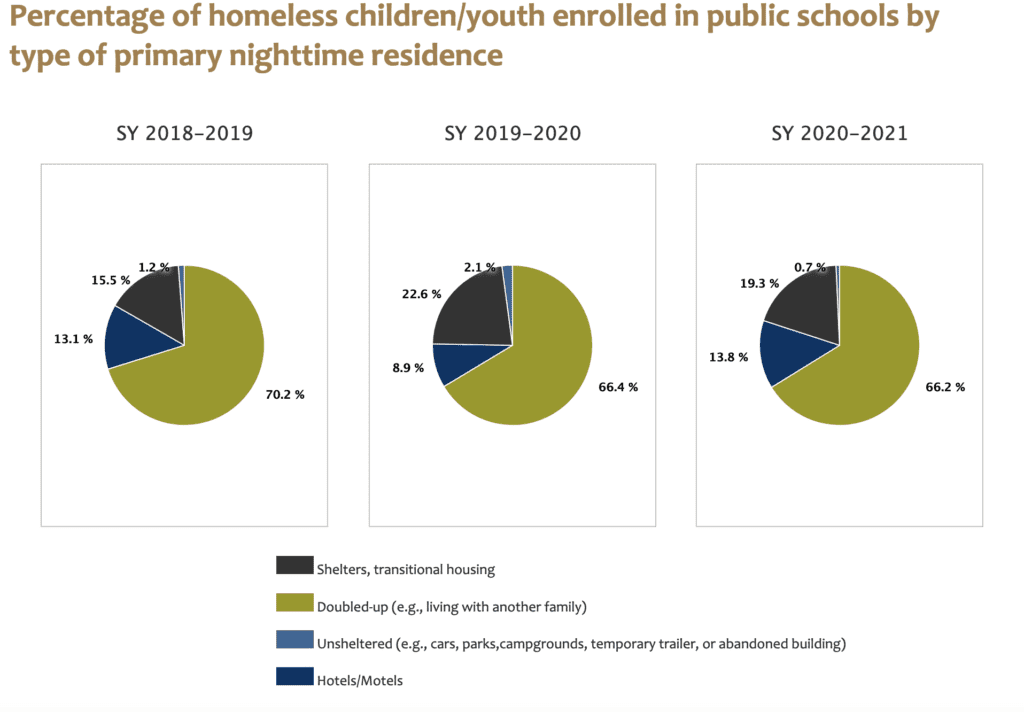
What does DCYF say?
We asked the RI Department of Children, Youth & Families (DCYF) if they had engaged with any families with children living outdoors, noting the reports mentioned by homeless advocates about the fear that parents who are homeless said they have.
We received this statement back: “DCYF is aware of [this] newspaper article and quote. Due to confidentiality laws, the Rhode Island Department of Children, Youth & Families cannot confirm or deny whether a family has any involvement with the department.”
We then posed a hypothetical to the department asking them what their policy is if it is learned children are living outdoors, particularly in harsh winter weather. Their response:
“DCYF recognizes that with limited resources many families are finding themselves in unstable living situations through no fault of their own. Homelessness, alone, when parents have made attempts to resolve the situation, does not constitute child maltreatment. In these instances, families are referred to our community partner agencies for supports. A child who is experiencing maltreatment who is also homeless would be subject to a CPS investigation to address the maltreatment allegations.
DCYF and its service providers make efforts to assist the family to address their living situation. In 2022, so far, DCYF has assisted more than 60 families by providing funding for lodging in extended day hotels. Presently the Department has more than 30 families temporarily housed in such hotels.”
Inadequate Shelter for Children
The DCYF Standards for Investigating Child Abuse and Neglect (CA/N) Reports policy includes Inadequate Shelter as a definition of a child abuse and neglect allegation that the Department would investigate. That language is noted as follows:
DOP 500.0025 Standards for Investigating Child Abuse Reports
25. Inadequate Shelter
a. Failure by the parent/caregiver to provide or seek to provide shelter which is safe, healthy, and sanitary and which protects the child from the weather conditions, and/or other risk situations.
b. To indicate this allegation, one of several types of evidence is needed:
i. confession of caregiver;
ii. observation by or findings of a child protective investigator, law enforcement or medical professional;
iii. witness statements;
iv. statement of victim.
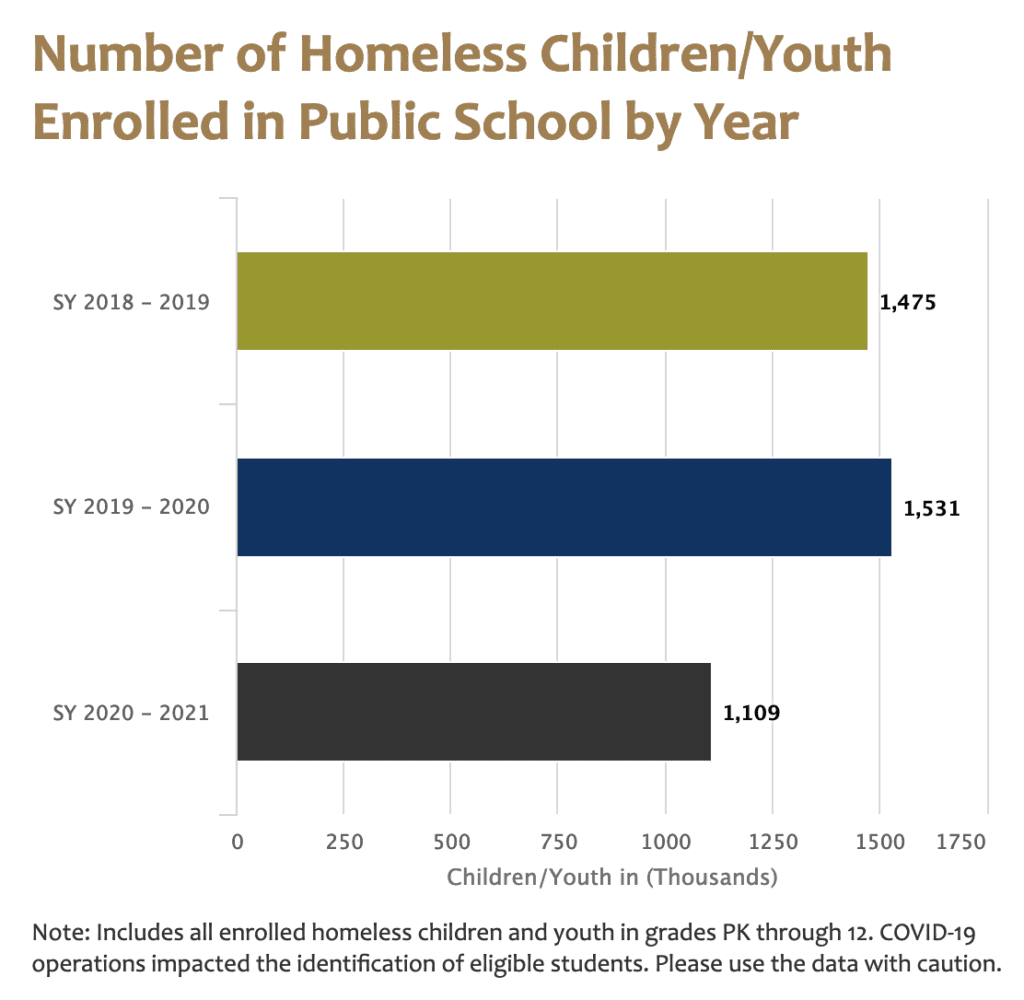
___
Homeless Children in Rhode Island
The Rhode Island Coalition to End Homelessness says that as of Nov. 30 there were approximately 615 people, including children, living in places not meant for habitation while they waited for spaces in shelters.
RI KIDS COUNT
In the report by RI Kids Count for 2021, they list data for Rhode Island families awaiting shelter:
• Shelter is not guaranteed and often not available due to capacity limits, and Rhode Island is not a right to shelter state.
• As of November 16, 2021, 1,013 Rhode Islanders were seeking shelter. Almost half (45%) of the people waiting for shelter were in families with children, and 267, or more than one-quarter (26%) were children under the age of 18.
• From October 8 – November 6, 2021, 574 Rhode Islanders slept outside or in their cars for at least one night, and 156 were in families with children. Almost half (44%) of the adults in these families with children had no income. During that 30-day period, 62 children under the age of 18 slept outside or in their family’s car for at least one night.
__
Rhode Island’s Annual Point-in-Time count
Each year homeless advocates conduct a point-in-time count of people experiencing homelessness on a single winter night.
The January 2021 count showed a dramatic increase in people experiencing homelessness, including a 26% increase in households with children (from 121 in 2020 to 153 in 2021).
In Rhode Island in 2020, 3% (114) of the 4,029 indicated allegations of child neglect were associated with inadequate food or shelter.
Recommendations of the Point-in-Time study were several, noting that “addressing families’ housing needs can reduce child neglect and abuse and help families stay together.” – the final point on their recommendations was: “Fill the position of Deputy Secretary of Commerce and Housing to oversee housing initiatives and develop a statewide housing plan.” This position was filled by Josh Saal, known informally as Rhode Island’s “housing czar”.
In Massachusetts:
In 2020, Massachusetts had the 3rd highest rate of family homelessness in the United States. 2,343 children are the estimated number of homeless children in Boston on any given night. This is enough to fill Boston Children’s Hospital five times. 65% of children admitted to the emergency room have a diagnosis of homelessness.
In Los Angeles:
This week Karen Bass was sworn in as the new Mayor of Los Angeles. In her campaign she promised to declare a state of emergency for the city’s homelessness crisis. It is estimated that 17,000 people live homeless in the city. 5 people die each day. Without a winter weather crisis. In her acceptance speech, Bass promised to keep her promise to declare the state of emergency and noted “we must have a single strategy bringing together government, the private sector and other stakeholders” to address the crisis.
The McKinney-Vento Homeless Assistance Act
The National Center for Homeless Education provides information on the federal McKinney-Vento Homeless Assistance Act requiring all school districts in the US to ensure access to public education for children and youth experiencing homelessness and to ensure their success in school once enrolled.
The McKinney-Vento Act ensures the educational rights and protections of students who lack a fixed, regular and adequate nighttime residence. This includes students who are:
- Living in emergency or transitional shelters;
- Sharing the housing of other people due to loss of housing or economic hardship;
- Living in motels, hotels or camping grounds due to the lack of an alternative adequate accommodation;
- Living in cars, parks, abandoned buildings, bus or train stations, or similar settings.
What is Rhode Island’s Coordinated Entry System (CES)
The CES system, which advocates say needs to stay in place, and the emergency placement of “encampment” people not on the list would bump out others in the queue, waiting. People in the CES system are not just first come first served, they are identified and placed in line by a number of factors. Said about the CES system:
• Coordinated entry is a nationally recognized process developed to ensure that people experiencing a housing crisis are quickly identified, assessed for, referred, and connected to housing and assistance and that everyone has fair and equal access to housing resources.
• In Rhode Island, the Coordinated Entry System is funded by the Consolidated Homeless Fund, the Continuum of Care, and the Emergency Solutions Grants and run by the Rhode Island Coalition to End Homelessness and Crossroads Rhode Island.
• The Coordinated Entry System serves Rhode Islanders who are currently homeless or who anticipate becoming homeless within the next 14 days.
The RI Homeless Bill of Rights
A major victory of homeless advocates was the passage of the Homeless Bill of Rights in 2012:
No person’s rights, privileges, or access to public services may be denied or abridged solely because he or she is homeless. Such a person shall be granted the same rights and privileges as any other resident of this state. A person experiencing homelessness:
(1) Has the right to use and move freely in public spaces, including, but not limited to, public sidewalks, public parks, public transportation and public buildings, in the same manner as any other person, and without discrimination on the basis of his or her housing status;
(2) Has the right to equal treatment by all state and municipal agencies, without discrimination on the basis of housing status;
(3) Has the right not to face discrimination while seeking or maintaining employment due to his or her lack of permanent mailing address, or his or her mailing address being that of a shelter or social service provider;
(4) Has the right to emergency medical care free from discrimination based on his or her housing status;
(5) Has the right to vote, register to vote, and receive documentation necessary to prove identity for voting without discrimination due to his or her housing status;
(6) Has the right to protection from disclosure of his or her records and information provided to homeless shelters and service providers to state, municipal and private entities without appropriate legal authority; and the right to confidentiality of personal records and information in accordance with all limitations on disclosure established by the Federal Homeless Management Information Systems, the Federal Health Insurance Portability and Accountability Act, and the Federal Violence Against Women Act; and
(7) Has the right to a reasonable expectation of privacy in his or her personal property to the same extent as personal property in a permanent residence.
Next steps: The court hearing to consider the case of the homeless – on its merits – brought by their attorney that resulted in a temporary restraining order will be considered tomorrow, Wednesday, December 13th. In the meantime, the Governor has requested a specific list of homeless encampments so they can reach out to them. It is unclear if this has been done, though a list by UpRiseRI was posted on Instagram:
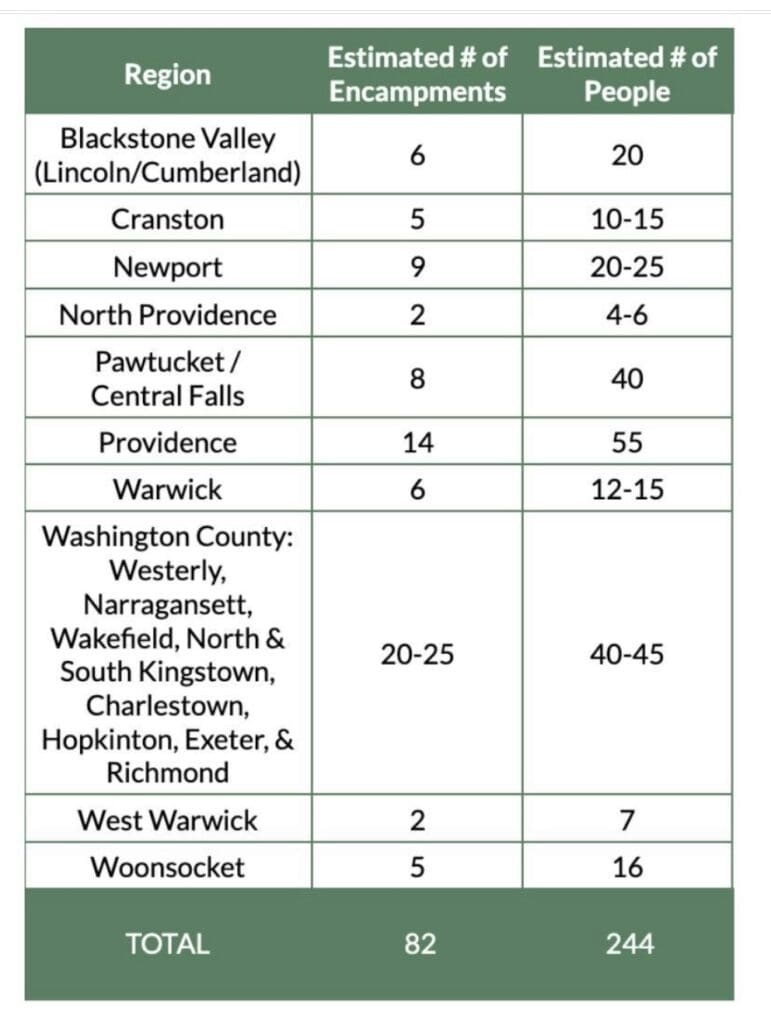
Please leave your comments, below – this section is monitored and comments will appear usually within the hour.

Ces list I was on it for 3 months they never kept in touch an after 3 months kicked my family off also when you call they really had no ideas or suggestions took all your information an that was the end by the grace of god I found a home with no help from them
Survivor